商学部(塾外用) - 慶應義塾大学-塾生HP
商学部(塾外用) - 慶應義塾大学-塾生HP
商学部(塾外用) - 慶應義塾大学-塾生HP
You also want an ePaper? Increase the reach of your titles
YUMPU automatically turns print PDFs into web optimized ePapers that Google loves.
Textbooks:<br />
Materials to be distributed in class<br />
Reference Books:<br />
Desmond Morris. Manwatching: A Study of Human Behavior.<br />
Kinseido. 1977.<br />
Robert M. Emerson. Contemporary Field Research. Long Grove, Il: c.<br />
2001.<br />
Theodore Bestor, Patricia Steinhoff, Victoria Bestor. Doing Fieldwork<br />
in Japan. Honolulu: University of Hawaii Press, c. 2003.<br />
CULTURE, CULTURAL ADJUSTMENT, AND IDENTITY<br />
2credits (Fall)<br />
文化・文化適応とアイデンティティ 2単位 (秋学期)<br />
How communication and identity are affected by culture<br />
文化がコミュニケーションと相互理解に与える影響<br />
Lecturer YOKOKAWA, MARIKO<br />
講師 横川 真理子<br />
Course Description:<br />
This course examines the impact of cultural values and beliefs on the<br />
process of cultural adjustment, the formation of cultural identity, and the<br />
relationship between language and culture. Third Culture Kids (Global<br />
Nomads),returnees, those with a bi-ethnic or ethnic minority background<br />
will be studied in relation to culture, cultural adjustment, and identity.<br />
In addition to the readings, students will be given opportunities to<br />
discuss critical incidents on instances of cultural misunderstanding, do<br />
presentations on a topic related to culture and identity, as well as other<br />
projects.<br />
Textbooks:<br />
Material to be given out in class.<br />
Reference Books:<br />
Richard Brislin and Tomoko Yoshida. Intercultural Communication<br />
Training: An Introduction. Sage Publications, Inc., 1994.<br />
Ruth Van Reken and David Pollock. The Third Culture Kid<br />
Experience. Yarmouth, Maine. Intercultural Press, 2001.<br />
Faith Eidse and Nina Sichel. (eds.) Unrooted Childhoods: Memoirs of<br />
Growing Up Global<br />
CULTURE AND THE UNCONSCIOUS 2credits (Spring)<br />
異文化と自己理解 2単位 (春学期)<br />
Exploring the Hidden World of Deep Culture<br />
Lecturer SHAULES, JOSEPH<br />
講師 ショールズ, ジョセフ<br />
Course Description:<br />
Culture has two sides, a visible side – food, clothing, architecture – and<br />
a hidden side of unconscious beliefs, values and assumptions. In this<br />
course we will learn the story of the discovery of hidden culture. We will<br />
explore culture’s unconscious influence over us, and see how hidden<br />
cultural difference creates conflict in relationships and communication.<br />
Students will discuss their intercultural experiences, share their opinions<br />
and give presentations. The ultimate goal of this course is a deeper selfunderstanding.<br />
Textbooks:<br />
Beneath the Surface : A Beginner's Guide to the Deep Culture<br />
Experience, Shaules, J., (2009), Intercultural Press<br />
Reference Books:<br />
1) Deep Culture: The Hidden Challenges of Global Living, by Joseph<br />
Shaules, Multi-lingual Matters, 2007<br />
2) Riding the Waves of Culture, by Trompenaars and Hampden-<br />
Turner, published by McGraw Hill<br />
89<br />
LEARNING FROM LIFE ABROAD 2credits (Fall)<br />
海外生活から学ぶ 2単位 (秋学期)<br />
Learning from life abroad<br />
Lecturer SHAULES, JOSEPH<br />
講師 ショールズ, ジョセフ<br />
Course Description:<br />
In this course, we will study the process of cultural learning--the<br />
changes we go through when we live abroad. We will look at the stages<br />
that sojourners (travelers, expatriates etc.) go through when adapting to<br />
new environments, including how one’s view of the world, values, and<br />
even identity can change. We will also learn about cultural difference and<br />
how to do cross-cultural comparison. The emphasis will be on the<br />
personal cultural learning experience. Students will share their<br />
intercultural experiences and give their point of view about cultural<br />
difference.<br />
Textbooks:<br />
Beneath the Surface: The Beginner's Guide to the Deep Culture<br />
Experience, (2009), Shaules, J., Intercultural Press<br />
Reference Books:<br />
1) Deep Culture: The Hidden Challenges of Global Living, by Joseph<br />
Shaules, Multi-lingual Matters, 2007<br />
2) Riding the Waves of Culture, by Trompenaars and Hampden-<br />
Turner, published by McGraw Hill<br />
HUMAN ENGINEERING 2credits (Spring)<br />
人間工学 2単位 (春学期)<br />
Human Factors<br />
Lecturer URAKAMI, JACQUELINE<br />
講師 浦上 ヤクリーン<br />
Course Description:<br />
The ergonomic design of products, working systems and interfaces<br />
focuses on designing a comfortable environment, and aims to prevent<br />
damages and accidents.<br />
Goal of the course is to provide an overview of the interdisciplinary<br />
field ergonomics.<br />
Furthermore the course intends to help students to understand what<br />
impact ergonomic product design has for our environment and in our<br />
everyday life.<br />
The course introduces various aspects of ergonomic design such as<br />
“Universal Design”, “Accessibility” or “Emotional Design”, demonstrates<br />
methods for the evaluation of products and systems, and discusses future<br />
trends.<br />
By means of practical examples students will experience the<br />
importance of an ergonomic design of products and systems.<br />
Discussions will help participants to clarify the goals of ergonomic<br />
design, and to understand its potential and its feasibility.<br />
Textbooks:<br />
Wickens, C.D. & Hollands, J.G. (2000). Engineering Psychology and<br />
Human performance. London: Prentice Hall.<br />
Salvendy, G. (2006). Handbook of Human Factors and Ergonomics.<br />
Hoboken, NJ: Wiley.<br />
Kroemer, K.H.E., Kroemer, H.B., & Kroemer-Ebert, K.E. (2001).<br />
Ergonomics: How to design for ease and efficiency. New Jersey: Prentice-<br />
Hall<br />
HUMAN RESOURCE MANAGEMENT FROM A<br />
PSYCHOLOGICAL PERSPECTIVE 2credits (Fall)<br />
心理学的観点から見る人材管理 2単位 (秋学期)<br />
Lecturer URAKAMI, JACQUELINE<br />
講師 浦上 ヤクリーン<br />
Course Description:<br />
Human Resources are the most valued assets in an organization and a<br />
critical success factor in business.<br />
Goal of Human Resource Management (HRM) from a Psychological<br />
Perspective is to enable employees to contribute to the enterprise<br />
productively. This course focuses on HRM from a psychological<br />
諸<br />
研<br />
究<br />
所



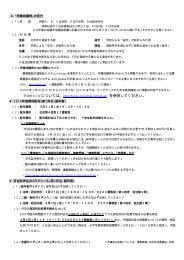
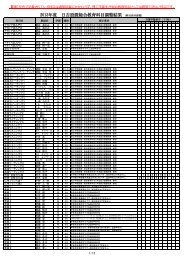
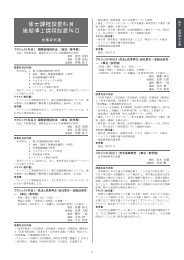
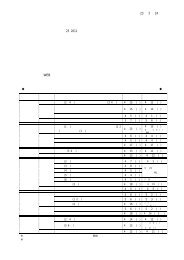
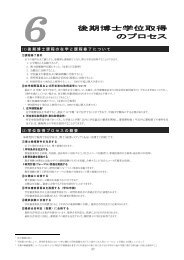
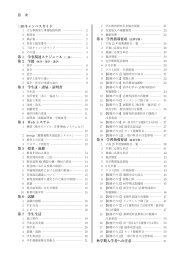



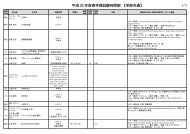

![文学部時間割表[2 ・3年生(07学則)]](https://img.yumpu.com/21046130/1/184x260/2-307.jpg?quality=85)

